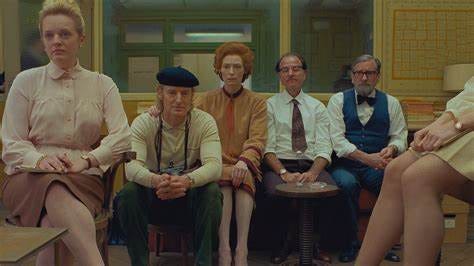Heartland: The French Dispatch
Wes Anderson's latest film is the epitome of style over substance. Beautifully shot and poetically written, this series of vignettes will leave viewers feeling empty.
However you write it, make it sound like you wrote it that way on purpose
— Bill Murray in “The French Dispatch.”
Wes Anderson has such a distinct style of filmmaking that his name has almost become a brand. You know exactly what you’re getting when you watch a Wes Anderson film, from the symmetrical staging of the backdrops to the quirky side characters, it’s all very familiar. Even the fonts have a consistent style.
Anderson is a filmmaker I’ve gone back and forth on. At times I didn’t understand what others saw in him (like “The Darjeerling Limited”) and other times I’ve thought he’s a genius (“The Grand Budapest Hotel” and his animated works). I’ve even strongly defended his lowest ranked film on Rotten Tomatoes (“The Life Aquatic with Steve Zissou”).
His latest offering, “The French Dispatch,” an episodic love letter to France and long-form essayists, is one of his worst movies. At the very least, it’s near the bottom.
If you’ve loved every thing he makes, then this won’t be a huge issue. Even a minor work of his is better an most standard Hollywood fare.
But if you’re already hit or miss on this 7-time Oscar nominee, then proceed with caution.
There’s a lot to like about this story of a small, New Yorker-style newspaper filled with lovable scribes. It’s visually top notch, as is expected from him, and it’s filled with talented A-list actors: Timothée Chalamet, Frances McDormand, Léa Seydoux, Bill Murray, Owen Wilson, Adrien Brody, Benicio del Toro, Jeffrey Wright, Tilda Swinton, Saorise Ronan and more.
While unmistakably Anderson, this film feels bold and daring with some of his most interestingly staged scenes, including an animated car chase.
Yet, there’s really no plot. It’s presented as different articles appearing in the last issue of this newspaper and the framing device is really needless and without any conflict.
After a brief prologue featuring Owen Wilson on a bike, the first real story is about an artistically inclined, imprisoned murderer (del Toro) and the prison guard he loves (Seydoux). It’s a real treat and sets a bar the rest of the film doesn’t reach. After this third of the movie was over, I was fully expecting this to rank among my favorite movies of 2021, but then the next two acts fell to earth with a thud.
In the proceeding story, McDormand and Chalamet are wasted in a tale about student revolutionaries, which was difficult to follow due to its quick-paced plot. Anderson’s beautifully verbose narration flows so quickly that I wish we had more time to linger and appreciate the prose. At times, I found myself trying to focus on words narrated by Frances McDormand, while also appreciate a beautifully framed shot. It really became tricky when fast-talking French subtitles are introduced and bounce around the screen, almost never in the same location twice.
The third and final episode, led by Jeffrey Wright, has potential but falls into many of the same traps as the second. Wright has a gorgeous speaking voice — I’d pay to hear him read me the iTunes terms of service — but his character delivers his lines so dispassionately that it felt more like a table read than an actual feature film.
There are a ton of characters in this 108-minute film, but I feel like I only really got to know one or two of them.
In the first act, Adrien Brody’s art dealer character talks about modern art. He shows how the imprisoned artist can perfectly draw a lifelike depiction of a bird but chooses to paint abstract shapes and forms instead. He’s able to create something traditional, but it’s his choice to make something different and more interesting, even if the public doesn’t always understand it.
I almost feel that way about Anderson. He’s capable of telling a standard, coherent story with a typical journey. I actually admire Anderson’s willingness to push himself to do something different and daring. It often ends up as a huge creative success. But in “The French Dispatch,” perhaps a traditional narrative would have helped. He wholeheartedly chooses style over substance, but at least the style is pretty incredible.
I’m not sure I liked “The French Dispatch.” I didn’t hate it. Perhaps it’ll grow on me, but I left the theater with almost no emotions stirring. I didn’t see the point and I kind of felt guilty that I didn’t enjoy it more.
In the final story, a chef recounts what it was like to ingest a deadly poison, saying, “It was a new taste. I can’t actually say it tasted good, but it was a new taste and at my age that’s a rare occurrence.”
As much as I struggled to swallow “The French Dispatch,” it was a new taste. And for that reason, I’m glad I partook.






